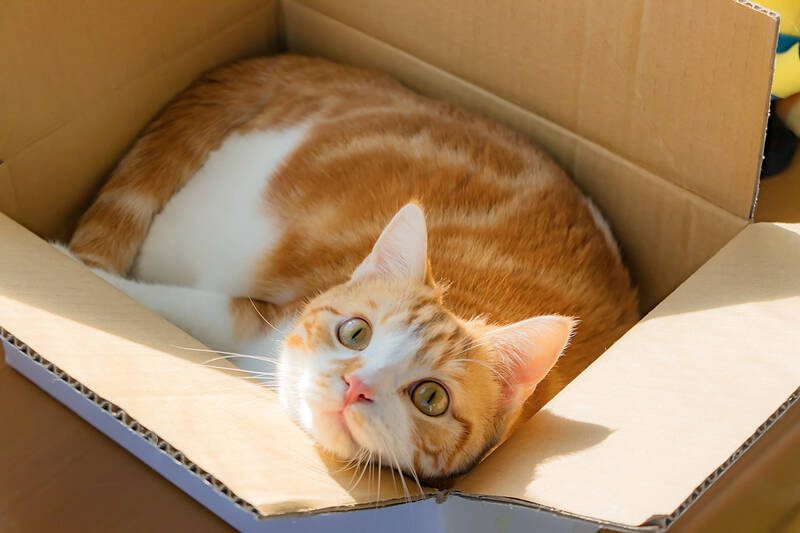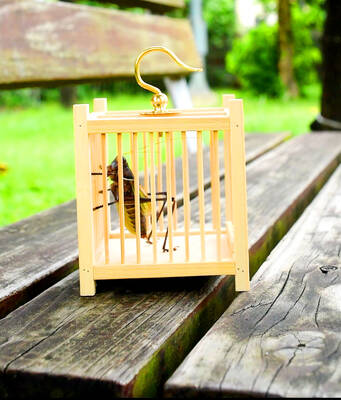Compared to dogs, cats are mysterious animals. One thing that has been especially hard to understand about them is their love for boxes. Give a cat a box, and they are happy creatures for hours. You might not believe this if you don’t have a cat, so check out the Internet. It’s filled with all kinds of funny videos of __1__ cats playing happily with cardboard boxes.
The question is: why do felines enjoy these __2__ so much? The fascination that cats have for boxes has puzzled many people, including those who do __3__ on animals. There are several theories that try to explain it.
One is that cardboard boxes provide __4__ comfort for cats. For one thing, they have a somewhat soft surface for them to lie on. For another, a cardboard box provides an extra bit of warmth that cats love, especially when the weather is cooler. What’s more, cats also enjoy the __5__ of cardboard boxes. They are soft enough for them to bite, chew on, and scratch.

Photo courtesy of AdobeStock 照片:AdobeStock 提供
Another big reason cats like cardboard boxes has to do with their natural __6__. They like to surprise other animals and jump on them. A box allows them to hide and pounce on anyone or anything that walks by them while they are in a box. The __7__ space also makes them feel safe because another animal can’t sneak up on them from behind while they are in the carton. This sense of __8__ helps cats feel less anxious and get used to new situations more quickly, as a Dutch study suggests.
Researchers from a Dutch university __9__ an experiment by giving half of the cats in an animal shelter boxes while not giving any to the other cats there. They discovered the cats given boxes had less stress than the other group and __10__ better to their new surroundings. As you can see, there are many reasons why cats love boxes.
和狗狗相比,貓咪是很神祕的動物。其中,特別難以理解的一件事,就是貓咪對箱子的熱愛。給貓咪一個箱子,牠們就可以樂好幾個小時。如果你沒有養貓,可能會覺得這種說法不足為信,那就上網搜尋看看吧。網路上充滿了各種可愛貓咪快樂地玩紙箱的有趣影片。

Photo courtesy of AdobeStock 照片:AdobeStock 提供
問題是,貓科動物為什麼如此喜愛這些容器呢?貓咪對箱子的迷戀使許多人感到困惑,就連研究動物的人也困惑不已。以下有些理論嘗試解釋喵星人的這種行為。
有一個理論認為紙箱提供了貓咪身體方面的舒適感。一來,紙箱有點軟的表面可以讓貓躺在上面。二來,紙箱提供了貓咪更多的溫暖,特別是當天氣比較冷的時候。再者,貓咪非常享受紙箱的觸感。因為紙箱夠軟,可以讓貓又咬又咀嚼,還可以用爪子抓抓。
另一個貓咪愛紙箱的重要原因和牠們的天性有關。貓咪喜歡嚇其他動物並跳到牠們身上。當貓咪在紙箱裡時,紙箱讓貓咪有個躲藏的空間,能猛撲到任何經過的人類或是東西上。紙箱密閉的空間也讓貓咪覺得安全,因為當牠們躲在紙箱時,其他動物就無法從背後偷偷靠近牠們。有個荷蘭的研究證實,這樣的安全感有助於減少貓咪的焦慮感,並且讓牠們可以更快習慣新的情況。

Photo courtesy of AdobeStock 照片:AdobeStock 提供
來自荷蘭一所大學的研究人員進行了一項實驗,他們將紙箱給了動物收容所裡一半的貓咪,而另一半的貓咪則沒有紙箱。他們發現有紙箱的貓咪壓力比另一組貓咪來得小,而且牠們也較能夠適應新環境。如你所見,喵星人熱愛紙箱有許多原因。
What Did You Learn?
(A) instincts
(B) physical
(C) enclosed
(D) cute
(E) security
(F) research
(G) adapted
(H) containers
(I) texture
(J) conducted
答案:
1. (D)
2. (H)
3. (F)
4. (B)
5. (I)
6. (A)
7. (C)
8. (E)
9. (J)
10. (G)
Words in Use
1. mysterious a. 神祕的,難以理解的
David Copperfield’s magic was so mysterious that everyone at his show was amazed.
大衛考柏菲的魔術實在是很神祕,參觀他表演的眾人皆驚歎不已。
2. creature n. 動物;生物
The forest is filled with unusual creatures.
這座森林裡住著很多奇特的生物。
3. fascination n. 迷戀
Peggy has a fascination for historic shoes.
佩姬對有歷史意義的鞋子有所迷戀。
4. puzzle vt. 使感到迷惑
This question really puzzles me. Maybe I should go ask the teacher.
這問題讓我很困惑。或許我該去問老師。
5. theory n. 理論
Many scientists believe the theory that the universe is getting larger.
許多科學家相信宇宙正在變大的這個理論。
Practical Phrases
1. compared to. . . 和……相較之下
Compared to his younger brother, who has a lively personality, Will is very quiet.
和他個性活潑的弟弟比起來,威爾很安靜。
2. be filled with. . . 充滿……
The kitchen was filled with the smell of cookies after I baked a dozen of them.
在我烤了一些餅乾後,廚房充滿了餅乾的味道。
3. chew on. . . 咀嚼/咬……
Dogs need leathery things to chew on to improve their oral hygiene.
狗狗需要嚼堅韌的東西來促進口腔衛生。
4. have to do with. . . 與……有關
Your headache might have to do with your lack of sleep.
你的頭痛問題可能和睡眠不足有關。
聽文章朗讀及講解: https://ivy.pse.is/455bfu
本文出自常春藤解析英語雜誌: www.ivy.com.tw

A: Google has unveiled its 2025 Year in Search chart. No. 10 to No. 6 are: Typhoon Podul, Chinese drama “Love’s Ambition,” tariffs, US President Donald Trump and singer Khalil Fong’s death. B: Wow, actress Rosy Zhao’s new drama is so popular. So what are the top five? A: No. 5 to No. 1 are: Gemini, hanzii.net, NT$10,000 cash handout, entertainer Big S’ death and earthquakes. B: Hasn’t Trump topped this year’s most-searched people chart? A: Yup, and he’s closely followed by cheerleader GuoGuo Chiang at No. 2, whose husband Zack Fanchiang is also at No. 8. Apparently, people are curious about her extramarital

In June, headlines shocked the art world when a visitor damaged a 17th-century painting at the Uffizi Galleries in Florence, Italy, while posing for a photograph. This was not an isolated event. Recently, similar disasters have been reported worldwide, from a child damaging a Mark Rothko painting to a tourist breaking an exhibit by pretending to sit on it. Such incidents highlight why museum etiquette is increasingly crucial. First, we must recognize that art and historical objects are fragile. Once damaged, they may never regain their original condition. Many common actions, though harmless at first glance, can have grave consequences. For

A: Compared to Taiwanese, what did Americans search for most in 2025? B: No. 10 to No. 6 are: Tariffs, FIFA Club World Cup, government shutdown, DeepSeek and incoming New York mayor Zohran Mamdani. A: Mamdani is set to take office on Jan. 1. And what are the top five? B: No. 5 to No. 1 are: the One Big Beautiful Bill Act, iPhone 17, Labubu doll, animated blockbuster KPop Demon Hunters and political activist Charlie Kirk’s assasination. A: The only term to appear on both the Taiwanese and US charts is tariffs. A: 跟台灣人相比,美國人都在搜尋什麼? B: 第10到6名是:關稅、FIFA俱樂部世界盃、政府關閉、DeepSeek語言模型、候任紐約市長佐蘭曼達尼。 A: 曼達尼元旦即將就任,前5名是什麼? B: 第5到1名是:《大而美法案》、iPhone 17、拉布布玩偶、動畫片《KPop獵魔女團》、政治活動家查理柯克遇刺。 A: 看來台、美熱搜榜唯一的共同議題就是--關稅! (By Eddy Chang, Taipei

The world is teeming with danger and unpredictability. To safeguard themselves from harm and invite good fortune, people across cultures carry or display symbolic charms and trinkets. It is common to see beckoning cat figurines in stores in Japan, while people in China have historically kept crickets in cages for good luck. Even flora can serve as emblems of luck, with the four-leaf clover standing out as perhaps the most iconic. A clover is a small plant that typically grows 10 to 30 cms in height. While there are many species of clover, the variety that people consider to